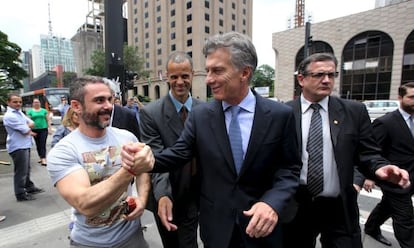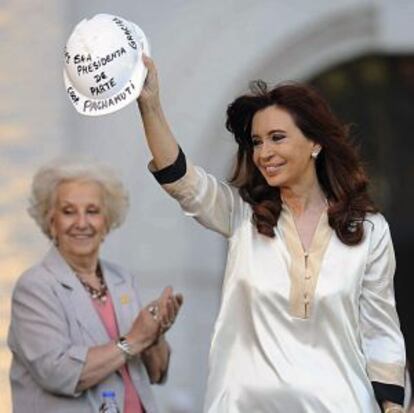Kirchner refuses to attend new president’s inauguration ceremony
Dispute over the logistics of the handover of power fuels political tensions in Argentina

A personal spat between outgoing Argentinean President Cristina Kirchner de Fernández and her successor, President-elect Maurico Macri, over Thursday’s inauguration details, has fueled political tensions in the South American country on the eve of the ceremony.
Fernández de Kirchner has decided she won’t attend the inauguration after the two side’s transition teams met to try to settle their differences, according to her advisors.
The dispute also revolves around what time Macri should be officially declared president
The dispute revolves around where the transfer of powers should take place, and at what time Macri should officially be declared president.
In a dramatic announcement, the president’s team said that Fernández de Kirchner would not be present to hand over the blue and white presidential sash and baton because of the conditions being imposed by her successor.
At one point, they defined the entire situation as “a coup d’etat” in reference to a prosecutor’s decision to accept Macri’s legal request to be declared president-on-duty from after midnight Wednesday. This would permit him to personally organize the inauguration ceremony.
As is common in Argentinean politics, the brouhaha between the outgoing leftist Peronist leader and the incoming conservative president has captured the attention of the nation.
“There isn’t much difference between a coup d’etat and this,” said Óscar Parrilli, chief of Argentina’s intelligence services and a close advisor to Fernández de Kirchner.
On Monday, Macri filed a petition with Buenos Aires Judge María Servini de Cubría – the same magistrate who is investigating human rights abuses committed in Spain during Francisco Franco’s dictatorship – to determine at what time Thursday she believed he will be considered president. He also asked the judge to decide where the ceremony should take place.
Macri, who was elected on November 22, believes that he should be officially declared president after midnight Wednesday and officially take office at noon following his inauguration.
The prosecutor sided with Macri, but Judge Servini de Cubría has not made her final decision.
“It looks like Macri is the one who doesn’t want the president to handover the sash and baton; they were the ones who started this legal fight,” said Wado de Pedro, general secretary of the Office of the Presidency and a negotiator in the transition team.
After the phone conversation, the president posted on her Facebook page that Macri had yelled at her
With tensions between the two factions running high, there is little chance that Argentineans will be able to catch a glimpse of Macri accepting the sash and baton from Fernández de Kirchner, a moment that will see the end of 12 years of “Kirchnerite” governments.
But in Argentina, anything is possible, right up to the last minute.
The spat began when the president and president-elect argued over the location where the handing over of the sash and baton should take place.

Fernández de Kirchner wants the ceremony to be held before Congress, where she accepted the same ceremonial symbols from her husband, the late President Néstor Kirchner. A congressional ceremony would also guarantee that her supporters are on hand to cheer her on.
For his part, Macri wants the handover at the Casa Rosada presidential palace, where it had traditionally taken place from the time democracy was restored in 1983. The event would an invitation-only affair.
Last weekend, Macri called Fernández de Kirchner to tell her that it was up to him to decide the location.
After the phone conversation, the president posted on her Facebook page that Macri had yelled at her – an allegation denied by his transition team, which includes his vice president-elect, Gabriela Michetti.
Notary General of the Republic Natalio Echegaray said the transfer of powers officially takes place when a president is sworn in. This means that the outgoing government organizes the ceremony, he said.
We are going to do what the Constitution tells us,” Fernández de Kirchner told reporters on Monday
Nevertheless, Echegaray said the ceremony “is normally held” at Casa Rosada.
“We are going to do what the Constitution tells us,” Fernández de Kirchner told reporters on Monday.
If no consensus is reached at the 111thhour, Macri said he will ask Supreme Court Chief Justice Ricardo Lorenzetti – a former Kirchner ally who has had confrontations in recent years with the president over judicial decisions – to present him with the sash and baton at Casa Rosada.
This, of course, will leave many Argentineans disappointed over the fact that they never got the chance to see Cristina Fernández de Kirchner handing over the presidency to her biggest political adversary, Mauricio Macri.
English version by Martin Delfín.
Tu suscripción se está usando en otro dispositivo
¿Quieres añadir otro usuario a tu suscripción?
Si continúas leyendo en este dispositivo, no se podrá leer en el otro.
FlechaTu suscripción se está usando en otro dispositivo y solo puedes acceder a EL PAÍS desde un dispositivo a la vez.
Si quieres compartir tu cuenta, cambia tu suscripción a la modalidad Premium, así podrás añadir otro usuario. Cada uno accederá con su propia cuenta de email, lo que os permitirá personalizar vuestra experiencia en EL PAÍS.
¿Tienes una suscripción de empresa? Accede aquí para contratar más cuentas.
En el caso de no saber quién está usando tu cuenta, te recomendamos cambiar tu contraseña aquí.
Si decides continuar compartiendo tu cuenta, este mensaje se mostrará en tu dispositivo y en el de la otra persona que está usando tu cuenta de forma indefinida, afectando a tu experiencia de lectura. Puedes consultar aquí los términos y condiciones de la suscripción digital.








































